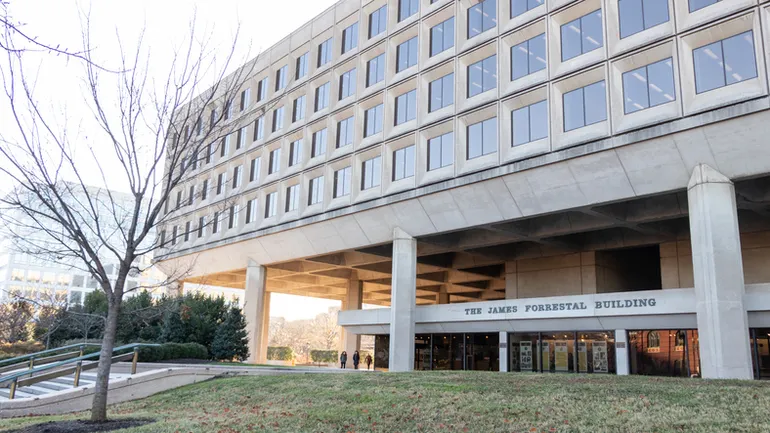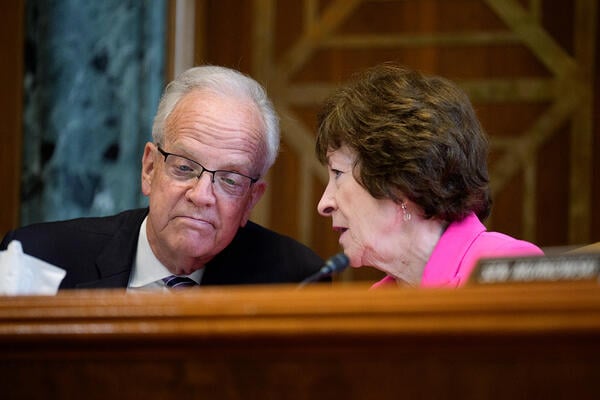Kristin Comrie is set to graduate this semester with a master’s in health informatics from a fully remote program that she balances with a full-time job. But the federal hiring freeze has thrown a wrench into her plans, prompting the Veterans Health Administration to cancel her unpaid internship, which she needed to fulfill a graduation requirement.
It wasn’t easy to find an opportunity that fit in with her job and schoolwork, but the VHA internship sounded ideal; she could work remotely, and the team at the VHA seemed happy to accommodate her busy schedule. Slated to start Feb. 10, she had just finished her background check and fingerprinting when she received notice that the internship had been canceled.
“I got a generic email that they were rescinding the offer because of the federal hiring freeze,” Comrie recalled.
The news left her “scrambling” to find another internship that she could finish in time to graduate in May. Two weeks later, she hasn’t yet found a new position but said she might be able to coordinate with her current employer to take on additional responsibilities in order to fulfill the requirement.
Comrie isn’t the only student to have had a federal employment opportunity abruptly rescinded. The hiring freeze appears to have forced federal agencies to cancel numerous internships; most prominently, thousands of legal internships and entry-level positions within the Department of Justice and beyond have been impacted, according to reports on social media and in news outlet like Reuters and Law360.
“We’ve most definitely seen impacts of the federal hiring freeze and subsequent actions related to college recruiting and internships. We’re hearing from colleges that there have been internships that have been canceled and we have heard that federal agencies have pulled out of going onto campuses to recruit,” said Shawn VanDerziel, executive director of the National Association of Colleges and Employers, an advocacy group for campus career centers and the businesses that work with them. “I would hope once the dust settles over the coming weeks and months that we will have many more answers and that the trajectory will be more positive.”
It represents a stark contrast from just a year ago, when the federal government finalized regulations to expand internship opportunities in an effort to hire younger talent. Government employees skew Gen X and older, with those over 55 making up a third of federal workers and those under 30 composing just 8 percent. To keep the government well staffed as the aging workforce retires, officials vowed to cultivate a younger demographic.
“Early career programs are critical to recruit the next generation of government leaders,” then–Office of Personnel Management director Kiran Ahuja told Government Executive, a publication focused on the federal government, in a statement. “The updates to the Pathways Programs will increase opportunities and remove barriers to hire interns, fellows, apprentices, recent students and trainees, which will help federal agencies boost their talent pipelines to serve the American people. No matter what your interests are, the federal government offers opportunities in nearly every sector and every industry.”
Those rules, finalized last April, went into effect in December, meaning they were in place for just over a month before the hiring freeze began on Inauguration Day.
For students, working in government is a rare opportunity to explore certain career specializations that are difficult to study elsewhere, like diplomacy. Federal internships often allow students to experience America’s center of government firsthand—and to get their foot in the door for a dream job.
“If you got a federal government internship, it means you’re quite capable,” said Brian Swarts, director of Pepperdine University’s D.C. program, one of approximately 40 satellite campuses in the capital dedicated to supporting and educating student interns. “It’s much more advanced than other internships. Generally speaking, students who have acquired a government internship are very excited about those opportunities … they’re seeing this as their one opportunity to move forward with a future role in the government.”
Inside Higher Ed reached out to a handful of the agencies that have reportedly cut internships—the Department of Justice, the Environmental Protection Agency, Health and Human Services, and Veterans Affairs.
In response to a series of questions, an EPA spokesperson responded, “There have been no mass cancellations of EPA internships. The EPA is diligently implementing President Trump’s executive orders and associated guidance.”
The other three offices did not respond to requests for comment.
Since the hiring freeze went into effect, the administration has carved out some exceptions, saying that agencies are “permitted” to make allowances for internships through the Pathways Programs, centralized programs that install interns, recent graduates and midcareer fellows across various agencies, aiming to convert them into full-time employees.
But the majority of interns for federal agencies are not part of the Pathways Programs.
Other exceptions would have to be carved out by the agencies themselves on a case-by-case basis, McLaurine Pinover, a spokesperson for OPM, said in an email.
Katie Romano, executive director of the Archer Center, which supports students from the University of Texas system in pursuing internships in D.C., told Inside Higher Ed that two current Archer fellows had spring semester internships rescinded—one a full-time and one a part-time position—but both have been able to transition to other opportunities in the city.
A director of another college’s D.C. program, who asked to remain anonymous, said no students from her institution had lost federal internships this spring. But she said that’s likely because several students backed out of opportunities with federal agencies after Trump was elected because they disagreed with his politics or feared chaos under his administration.
“My fear from a macro level is we’re going to turn off an entire generation of young people from civil service as they’re watching all of this. If you were 21 and thinking about what you were going to do after graduation and looking for an internship that would set you up for success and you see this going on, you might just choose to pivot your entire plan,” she said.
‘It’s Been Very Stressful’
Law students, in particular, have found themselves struggling to find new opportunities; since most law interns are hired months before their onboarding date, few private firms have spots left, leaving those who lost internships with minimal options for summer work.
“In the law school world, not working on your summers is not necessarily going to destroy your future career, but a lot of postgrad employers look at that quizzically,” said Dylan Osborne, a second-year Brooklyn Law School student who was slated to work at the Internal Revenue Service this summer until he received an email that the internship had been canceled due to the hiring freeze.
Moreover, many of the students with federal job offers in hand had already begun making arrangements to live in D.C. for the summer.
One second-year law student said that while she was fortunate not to have signed a lease in D.C. before her internship offer was rescinded, she’d already told her current landlord she would not be renewing her lease, which expires in May.
Now, with no job on the horizon, the student, who requested anonymity out of fear of jeopardizing her career, said she is “in limbo,” unsure where she will live or how much money she will earn over the summer.
Since she received notice that her internship was canceled, she now spends as many as five hours a day applying for positions and talking on the phone with firms.
“It’s been very stressful, especially because I took on extra responsibilities knowing I didn’t have to worry about the [job] application process,” she said. “It’s like taking on another job in itself.”
Andrew Nettels, a third-year law student at George Washington University whose permanent job offer from the DOJ was rescinded, has organized a massive group chat of law students and new lawyers whose employment prospects were impacted by the hiring freeze. He said few members of the group—which maintains a document of opportunities and firms taking interns—have had success finding replacement positions.
“I’m not personally aware of anyone finding anything new. I’m aware of maybe three people who have had interviews,” he said, noting that members of the chat are encouraged to share their successes. “This isn’t to place any blame at all on the private sector—we’re already several months off the recruitment cycle … their hiring committees have been trying to figure out whether they’d be in a financial position as a firm to commit to hiring one or two or however many students for the summer, and even postgraduates—it’s a huge commitment.”
Professors, administrators and career center specialists are also working diligently to help students secure replacement positions, with some reaching out to their networks on social media in the hopes of finding leads.
“The old saying ‘it takes a village’ could not be more appropriate right now. I have no doubt my LinkedIn ‘village’ can help not just William & Mary Law School students but also students at other schools who are anxiously and unexpectedly having to pivot as a result of the hiring freeze,” wrote Michael Ende, associate dean for career services at William & Mary Law School, in a LinkedIn post.
According to an emailed statement from William & Mary Law School dean A. Benjamin Spencer, 13 students lost their summer internships due to the hiring freeze, and others likely would have secured positions at federal agencies in the coming months.
“We have met or will be meeting with every student who lost their positions with federal agencies (including graduating 3Ls who lost post-graduation offers). We are helping them to restart their job searches, which includes helping them figure out what types of positions to target and getting them connected to alumni and others in the profession who have been offering their assistance by sharing internship and job openings and expressing a willingness to speak with impacted students to guide them in this time of need,” Spencer wrote.
Osborne said that he has heard from some law students who are still hoping that their positions might be reinstated after the hiring freeze is slated to end in late April. But it’s a gamble most, including Osborne, aren’t willing to take.
“There are some people who are hoping to wait the spring out and see if their positions are unfrozen, so to speak,” he said. “But given the attitude the administration has towards the IRS, I don’t think I’m going to be one of those people.”








